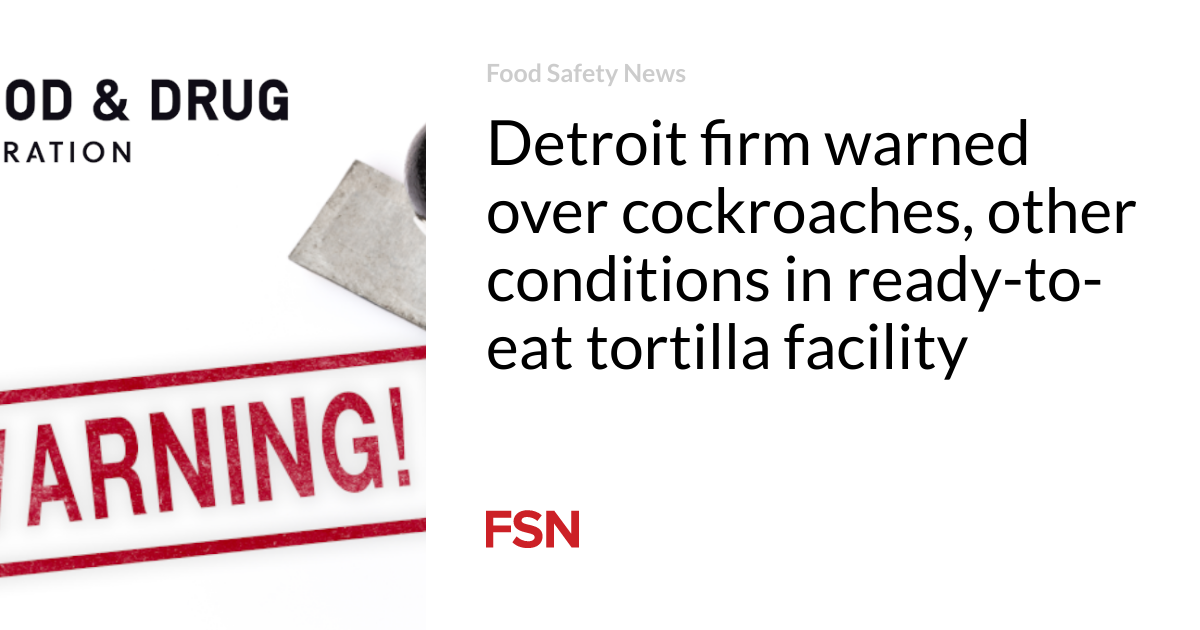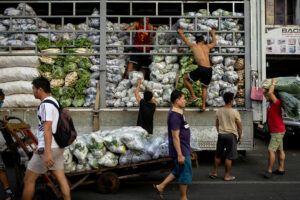Food
Detroit firm warned over cockroaches, other conditions in ready-to-eat tortilla facility

The Food and Drug Administration sends warning letters to entities under its jurisdiction as part of its enforcement activities. Some letters are not posted for public view until weeks or months after they are sent. Business owners have 15 days to respond to FDA warning letters. Warning letters often are not issued until a company has been given months to years to correct problems.
Hacienda Mexican Foods LLC
Detroit, MI
A food firm in Michigan is on notice from the U.S. Food and Drug Administration (FDA) for violations of the Current Good Manufacturing Practice, Hazard Analysis, and Risk-Based Preventive Controls for Human Food regulation.
In an April 4, 2024 warning letter, the FDA described an April 21, 2023, inspection of Hacienda Mexican Foods LLC’s ready-to-eat (RTE) soft wheat flour tortilla manufacturing facility located in Detroit, MI.
FDA investigators determined that the company’s RTE soft flour tortillas manufactured in their facility are adulterated in that they were prepared, packed, or held under insanitary conditions whereby they may have become contaminated with filth or rendered injurious to health. Other observations include the firm not cleaning and sanitizing their utensils or equipment in a manner that protects against contamination of food-contact surfaces, cockroaches and more.
After the inspection, the FDA investigator issued a Form FDA-483, Inspectional Observations, listing deviations found at the facility.
Some of the significant violations
Hazard Analysis and Risk-Based Preventive Controls:
1. The firm’s hazard analysis for RTE soft flour tortillas did not identify and evaluate all known or reasonably foreseeable hazards to determine whether there are any hazards requiring a preventive control, as required.
A. They did not identify and evaluate recontamination with environmental pathogens, such as Salmonella, to determine whether it is a hazard requiring a preventive control in their RTE soft flour tortillas, as required. Specifically, the firm’s written hazard analysis did not consider the hazard of recontamination with environmental pathogens at the “(redacted by FDA)” and “(redacted by FDA)” steps. In addition, although their hazard analysis considered this hazard at the “(redacted by FDA)” step, it determined that a preventive control was not necessary due to “SOP in place for personnel hygiene and SOP facility sanitization.” Their RTE tortillas are exposed to the environment prior to packaging where they could be contaminated with environmental pathogens such as Salmonella and do not receive a lethal treatment or otherwise include a control measure (such as formulation lethal to the pathogen) that would significantly minimize pathogens. Therefore, contamination with environmental pathogens is a known or reasonably foreseeable hazard, and a knowledgeable person manufacturing/processing food in their circumstances would identify recontamination with environmental pathogens as a hazard requiring a preventive control (i.e., sanitation controls). Sanitation preventive controls include procedures, practices, and processes to ensure that the facility is maintained in a sanitary condition adequate to significantly minimize or prevent hazards such as environmental pathogens.
The firm’s food safety plan, under the heading “Cleaning and Sanitizing Procedure” in the “Sanitation Preventive Controls” section, provides a general description of their facility’s cleaning and sanitation program components. These components do not identify any specific production equipment. The “Procedure” component references “Pre-op forms in process,” which was described by their Food Safety Assistant as the electronic spreadsheet titled “Cleaning and Sanitation Record” that their firm uses to document sanitation monitoring. However, this spreadsheet does not contain any written sanitation procedures or corrective action procedures.
In addition, sanitation preventive controls are subject to preventive control management components including monitoring, corrective actions, and verification as appropriate to ensure effectiveness of the preventive controls, taking into account the nature of the preventive control and its role in the facility’s food safety system.
FDA notes that their food safety plan and related procedures do not include adequate corrective action procedures that include steps to identify and correct the problem, reduce the likelihood the problem will recur, evaluation of all affected food for safety, and preventing all affected food from entering commerce if they cannot ensure food is not adulterated.
Further, an environmental monitoring program is a required sanitation verification activity for their RTE soft flour tortillas, as they are exposed to the environment prior to packaging. Their food safety plan, under the heading “Environmental Monitoring for Sanitation Control Verification,” includes references to a document titled “Microbial Control/Environmental Policy.” When asked by FDA investigators, the firm was unable to provide the “Microbial Control/Environmental Policy” and further stated that this policy was not implemented. FDA investigators also noted that their facility only performs environmental sampling (redacted by FDA) and only for Enterobacteriaceae (Eb). Eb is not a pathogen, and it is not an adequate indicator organism for the pathogen, Salmonella. As such, the firm’s environmental monitoring program is not verifying the effectiveness of their sanitation controls for Salmonella or other environmental pathogens.
B. The firm did not identify and evaluate mycotoxins as a known or reasonably foreseeable hazard to determine whether they require a preventive control. Their facility manufactures RTE soft flour tortillas that contain wheat flour, which is an ingredient associated with mycotoxins such as deoxynivalenol (a.k.a. vomitoxin). A knowledgeable person manufacturing/processing food in their circumstances would identify mycotoxins as a hazard requiring a preventive control in this ingredient. A facility that identifies raw materials and other ingredients that require a supply-chain-applied control, such as vomitoxin in wheat flour, must establish and implement a risk-based supply-chain program for those raw materials and ingredients.
The firm’s food safety plan has a section titled “Supply-chain applied Preventive Control Program,” which lists flour as having potential hazards of “Foreign Materials & Microorganisms,” but it does not specify vomitoxin or mycotoxins. This section lists a “verification method” of “Certificate of Analysis with (redacted by FDA)”; however, FDA investigators noted that a certificate of analysis (CoA) their firm received from their wheat flour supplier did not include any vomitoxin testing results. The firm also provided a letter from their wheat flour supplier titled, “FSMA VOMITOXIN REQUIREMENTS,” dated Jan. 6, 2022, which describes their supplier’s frequency of testing grain ((redacted by FDA)), frequency of testing finished product ((redacted by FDA)), vomitoxin testing method, and corrective actions. However, there is no vomitoxin testing data included in the letter, and their firm did not have CoAs indicating their wheat flour supplier has conducted vomitoxin testing on any shipments of flour their firm has received.
C. The firm did not appropriately identify and evaluate the hazard of “Survival of microorganisms due to low temperature” to determine whether it is a hazard requiring a preventive control for their RTE soft flour tortillas, as required.
The firm’s hazard analysis considered the hazard of “Survival of microorganisms due to (redacted by FDA)” at the “Baking” step but did not identify it as a hazard requiring a preventive control. The firm manufactures RTE soft flour tortillas made from wheat flour. Wheat has been associated with vegetative bacterial pathogens such as pathogenic Escherichia coli (E. coli) and Salmonella. A knowledgeable person manufacturing/processing food in their circumstances would identify bacterial pathogen survival of a lethal treatment as a known or reasonably foreseeable hazard that requires a preventive control (i.e., process controls). Process preventive controls include procedures, practices, and processes to ensure control of parameters during operations such as baking. Process controls must also include the parameters associated with the control of the hazard and the maximum or minimum values needed to significantly control the hazards.
The firm’s hazard analysis includes a written justification for not considering the hazard of “Survival of microorganisms due to (redacted by FDA) temperature” at the “Baking” step of “Kill step will eliminate pathogens” and further states, “SOP’s in place for Temperature requirements for Quality and Safety.” However, their food safety plan does not include written baking procedures or established parameters for baking time and/or temperature. The firm’s Food Safety Assistant informed FDA investigators that their firm does not have a documented established critical limit for baking time and temperature or any validation for the adequacy of the baking process. In addition, the firm’s employees informed FDA investigators that the “SOP’s in place for Temperature requirements for Quality and Safety” had not been created and could not be provided. Preventive controls are subject to preventive control management components (monitoring, verification, and corrective actions) as appropriate to ensure the effectiveness of the preventive controls, taking into account the nature of the preventive control and its role in the facility’s food safety system. They must also validate that the preventive controls are adequate to control the hazard as appropriate to the nature of the preventive control and its role in the facility’s food safety system.
Furthermore, the firms does not have controls in place to address the hazard of survival of bacterial pathogens such as Salmonella and E. coli in the baking process. While FDA investigators observed production of RTE soft flour tortillas, they noted that the digital temperature display for the oven did not appear to be functioning. The firm management confirmed that it was not functioning, and it could not provide a temperature readout. The firm’s Production Manager indicated that the digital temperature display has not functioned at any point while he had worked at their firm, which is approximately 20 years. FDA investigators noted that the firm manufactures RTE soft flour tortillas of varying size with the following raw dough weights: 5 inch and 6 inch tortillas – 1.2 -ounce raw dough, 8 inch tortillas – 1.7-ounce. raw dough, 10 inch tortillas – 2.5-ounce raw dough, and 12 inch tortillas – 4.0-ounce raw dough. The firm’s Production Manager stated that their firm does not change the oven belt speed at the baking step for any of the different tortilla types or sizes.
On April 17, 2023, during the production of RTE 8-inch whole wheat flour tortillas, the hot tortilla press malfunctioned resulting in unpressed balls of raw dough proceeding through the oven, onto the RTE tortilla (redacted by FDA) cooling conveyor, and then onto the RTE tortilla conveyor belt that leads to the RTE tortilla counter/stacker. After exiting the oven, the unpressed balls of raw dough did not appear to be fully cooked. This process continued for approximately 10 minutes before the firm shut the line down for repairs. Neither the RTE tortilla (redacted by FDA) cooling conveyor nor the RTE tortilla conveyor belt were re-cleaned or re-sanitized while the line was running when the first balls of unpressed dough were discovered.
2. The firm did not identify and implement preventive controls to provide assurances that any hazards requiring a preventive control will be significantly minimized or prevented and the food manufactured, processed, packed, or held by their facility, as required. Specifically, they did not identify and implement an allergen preventive control for allergen labeling. Their food safety plan has a section for “Food Allergen Preventive Controls,” and this section identifies the “Product” as “All Flour Tortillas,” the “Allergen Statement” as “Contains Wheat,” and the “Label Number” as “Label Control under labeling program.” Their Food Safety Assistant stated that they do not verify that the allergen statement “Contains Wheat” is on the finished product label. They stated that the labels are verified for correct allergen statements only when they are received. Our investigators requested how this information was documented and were provided with the “AP[P]ROVED LABEL” document. The firm’s Food Safety Assistant stated that there were no completed copies of this document and that use of this document has not been implemented. In addition, their food safety plan does not include the required preventive control management components such as monitoring, corrective action, or verification procedures or records. According to their food safety plan, all flour tortillas manufactured at their facility contain wheat, a known allergen. Therefore, the firm is not adequately controlling the hazard of undeclared allergens.
Current Good Manufacturing Practice
1. The firm did not clean and sanitize their utensils or equipment in a manner that protects against contamination of food-contact surfaces, as required. Specifically,
a. During cleaning operations at the end of the day on April 3, 2023, one of their firm’s employees used a high pressure hose to spray the floor of the raw production area resulting in water pooling over top of a floor drain and overspray contacting raw dough production equipment and empty mesh baskets that their firm uses to hold raw dough balls.
b. On the morning of April 11, 2023, during sanitization of the RTE tortilla (redacted by the FDA) cooling conveyor prior to the start of production, an employee used a hand-held spray bottle that produced a single stream of sanitizer which did not uniformly apply sanitizer on all food contact surfaces. After completion of sanitization and prior to the start of production, apparent residue and food particles were observed adhering to the food contact surface of the RTE tortilla (redacted by the FDA) cooling conveyor. The firm used this equipment in this condition for RTE tortilla production.
c. On April 11, 2023, after completion of sanitization of tortilla production equipment and prior to the start of production, the following was observed on non-food contact surfaces of the RTE tortilla counter/stacker directly below the bungee bands (food contact surface) that convey stacks of unpackaged RTE tortillas: blackened residue on the inside edges of the plastic that houses piping that lowers tortillas, food particles and residues on the joint between the white plastic and adjoining stainless steel, and food particles and residues in the screw holes holding the plastic to the equipment.
2. The firm did not maintain buildings, fixtures, and other physical facilities in their plant in a clean and sanitary condition and in repair adequate to prevent food from becoming adulterated, as required. Specifically:
a. On April 3 and/or 6, 2023, our investigators observed broken concrete around the following four floor drains:
1. Floor drain located in the raw production area near the 3-compartment sink that had grey/cloudy standing water on it that did not appear to drain during the duration of the production day;
2. Floor drain located in the raw production area approximately 6’ away from the raw dough ball cutter;
3. Floor drain located in the raw production area approximately 7’ away from the hot tortilla press; and
4. Floor drain located in the RTE production area approximately 6’ away from the RTE tortilla (redacted by the FDA) cooling conveyor.
According to the firm’s Production Manager and Supervisor, the floor drain observed with grey/cloudy standing water on it had been in this condition for approximately one week. FDA investigators also observed the firm’s employees walking back and forth over the floors where the above-mentioned floor drains are located and between the raw and RTE production areas of their facility.
b. On April 6, 2023, FDA investigators observed debris buildup on three panels hanging directly above the RTE tortilla (redacted by the FDA) cooling conveyor where RTE tortillas exit the oven.
c. On April 6, 11, and 17, 2023, FDA investigators observed chipping paint that is similar in color to raw tortilla dough and finished RTE tortillas on the following metal production equipment:
1. Food contact surface of the dough hopper where raw tortilla dough exits the hopper,
2. Non-food contact surface of the interior walls of the dough hopper surrounding the conveyor transporting raw tortilla dough into the dough ball cutting machine,
3. Non-food contact surface of the interior of the dough cutter,
4. Non-food contact surface of the side rails of the RTE tortilla (redacted by the FDA) cooling conveyor, and
5. Non-food contact surfaces adjacent to each side of the RTE tortilla conveyor belt.
d. On April 6, 11, and 17, 2023, FDA investigators observed raw dough on the floor in the raw production area next to the dough cutter and mesh baskets that are used for transporting raw tortilla dough balls. FDA investigators also observed the firm’s employees passing from the RTE production area through this raw production area and then back to the RTE production area without changing or cleaning their shoes when crossing over from the raw production area to the RTE production area. On April 11, 2023, prior to the start of production, an FDA investigator observed a piece of raw dough on the floor with live ants on it in the RTE production area near the exit of the oven and next to the RTE tortilla (redacted by the FDA) cooling conveyor.
3. The firm did not take effective measures to exclude pests from their food plant to protect against contamination of food, as required. Specifically, on April 11, 2023 during sanitization and manufacturing operations for 12-inch flour tortillas with Julian date code 23100 Best by 5/25/23, FDA investigators observed 10-15 live apparent cockroaches in various areas of their facility, including the RTE tortilla packaging area, near the RTE tortilla (redacted by the FDA) cooling conveyor, near the 3-compartment sink, and next to unused finished product boxes.
Misbranding
1. The firm’s 313 Urban Tortillas brand Street Taco Flour Tortillas, Taco & Fajita Flour Tortillas, and Wraps products are misbranded in that the labels are false or misleading. Specifically, their 313 Urban Tortillas brand products declare “Soy Free” on the principal display panels; however, the tortillas are fabricated, in part, using a soy-based shortening comprised of soybean oil and hydrogenated soybean oil, both of which are declared in the ingredient statements on the product labels. Therefore, the “Soy Free” claim on the product labels is false or misleading.
2. The firm’s 313 Urban Tortillas brand Street Taco Flour Tortillas, Taco & Fajita Flour Tortillas, and Wraps products are misbranded because the Nutrition Facts labels do not meet the requirements. Specifically, the labels bear the nutrient content claims, “CHOLESTEROL FREE” and “ZERO TRANS FAT” but the Nutrition Facts labels do not include declarations for polyunsaturated fat and monosaturated fat, as required, when a claim is made about fatty acids or cholesterol.
The full warning letter can be viewed here.
(To sign up for a free subscription to Food Safety News, click here.)













